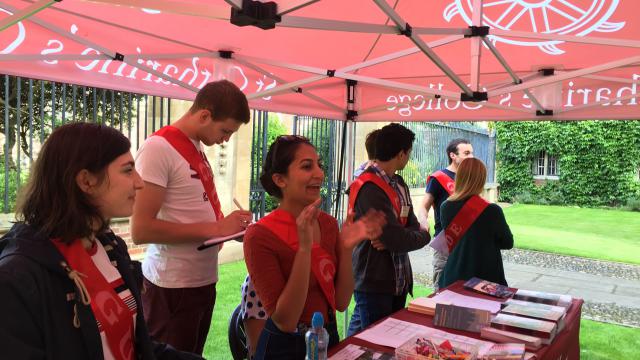Name: Ryan Comins
Hometown: Cambridge, UK (via Canterbury, London and Flintshire, North Wales)
Extracurricular interests: Reading, interfaith discussion events, music (classical, liturgical and extreme metal)
Postgraduate degree: PhD in Theology and Religious Studies
Life before Catz
“After I completed my undergraduate studies in 2019, I decided to pursue a PGCE with the Faculty of Education at Cambridge. This was somewhat disrupted by the outbreak of the COVID-19 pandemic, but I was able to complete it and then moved to London to work as a teacher of Philosophy and Religion at a secondary school in Surrey. I loved the school and found teaching very rewarding, but I found the gravitational pull of Cambridge difficult to resist for long and ended up returning for an MPhil in Hebrew Bible/Old Testament studies in 2022. I transferred to Catz (from Caius) a few months ago to begin my PhD."
Life at Catz
“I'm among the postgraduate students who do not live in College accommodation but I have still loved my experiences of being in Catz so far: the library is such a calm and peaceful place to work; the dining hall is refreshingly modern; and the chapel services that I have attended have been beautiful. I look forward to getting to know the College better over the course of my PhD."
Postgraduate studies
“My main research interest is in the transmission, reception, and interpretation of the Hebrew Bible/Old Testament in classical antiquity, especially as reflected in the Septuagint (the Greek Old Testament). My PhD project is focused on the earliest extant Greek version of the biblical book of Ecclesiastes. I analyse the relationship between the Greek translation and the Hebrew source text and assess what the translators’ renderings suggest about their interpretation of the text and their exegetical approach.
"I have been interested in the interaction of language and religion since childhood, having grown up in a religious community which used a distinctive variety of English for religious purposes and had a founding narrative of sacred translation. As a Theology undergraduate, I learned Greek to study the New Testament in its original language. In my final year, James (‘Jim’) Aitken introduced me to Jewish Greek literature, including the Septuagint translations, as well as contemporary extra-biblical sources of Greek. This opened a wealth of new research possibilities to me, and the Septuagint has been my primary research focus ever since."
The Harding Distinguished Postgraduate Scholars Programme
“The most obvious and immediate benefit is that it has enabled me to pursue a PhD, which has been a dream of mine since childhood and would not have been possible for me without the scholarship. The programme has also enabled me to attend an international conference in Texas in the first term of my PhD, where I interacted with several scholars whose presentations and research have proven invaluable for my own project."
Advice for undergraduates thinking of applying for postgraduate studies
“It is not a decision to be taken lightly, as it can be very demanding and can be all-absorbing at times. There is nothing wrong with taking a couple of years to try something different first, and in fact I feel that the time I spent training and working as a teacher has in fact been beneficial to my postgraduate research in unexpected ways. On the other hand, don’t be put off by scary stories: if research is something that you find rewarding, postgraduate study can be a deeply satisfying way to spend your time. I get to spend my days reading, thinking, talking, and writing about subjects that I love, and this is a privilege not to be undervalued."






